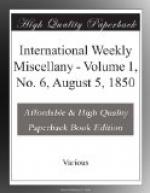That building was indeed a castle: the village belonged to it, and both were the property of the Baron Friedenberg. “Friedenberg!” repeated Edward: the name sounded familiar to him, yet he could not call to mind when and where he had heard it. He inquired if the family were at home, hired a guide, and arrived at length by a rugged path which wound itself round steep rocks, to the summit of them, and finally to the castle, which was perched there like an eagle’s nest. The tinkling of the bells on Edward’s sledge attracted the attention of the inmates; the door was opened with prompt hospitality; servants appeared with torches; Edward was assisted to emerge from under the frozen apron of his carriage, out of his heavy pelisse, stiff with hoar-frost, and up a comfortable staircase into a long saloon of simple construction, where a genial warmth appeared to welcome him from a huge stove in the corner. The servants here placed two large burning candles in massive silver sconces, and went out to announce the stranger.
The fitting-up of the room, or rather saloon, was perfectly simple. Family portraits, in heavy frames, hung round the walls, diversified by some maps. Magnificent stags’ horns were arranged between; and the taste of the master of the house was easily detected in the hunting-knives, powder-flasks, carbines, smoking-bags, and sportsmen’s pouches, which were arranged, not without taste, as trophies of the chase. The ceiling was supported by large beams, dingy with smoke and age; and on the sides of the room were long benches, covered and padded with dark cloth, and studded with large brass nails; while round the dinner-table were placed several arm-chairs, also of ancient date. All bore the aspect of the good old times, of a simple, patriarchal life with affluence. Edward felt as if there were a kind welcome in the inanimate objects which surrounded him, when the inner-door opened, and the master of the house entered, preceded by a servant, and welcomed his guest with courteous cordiality.




